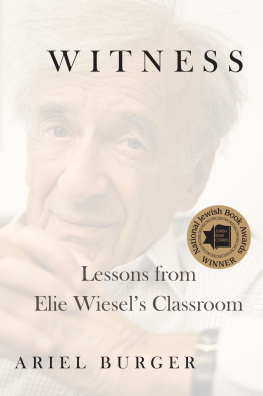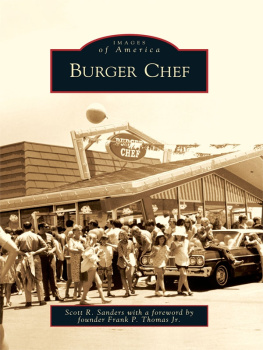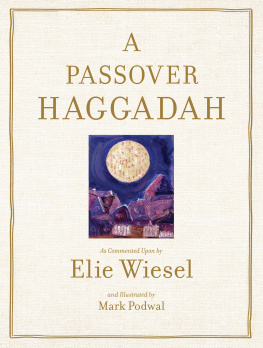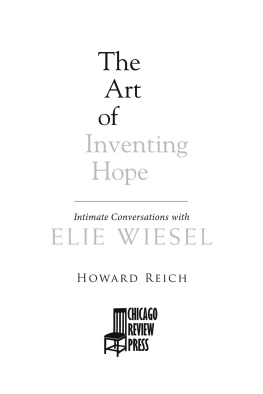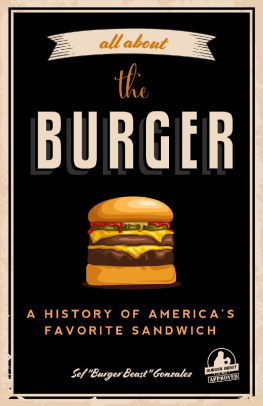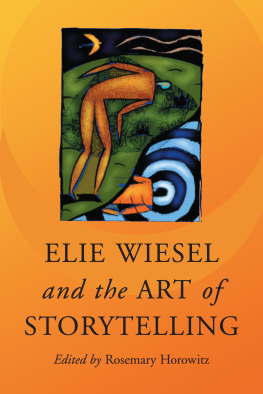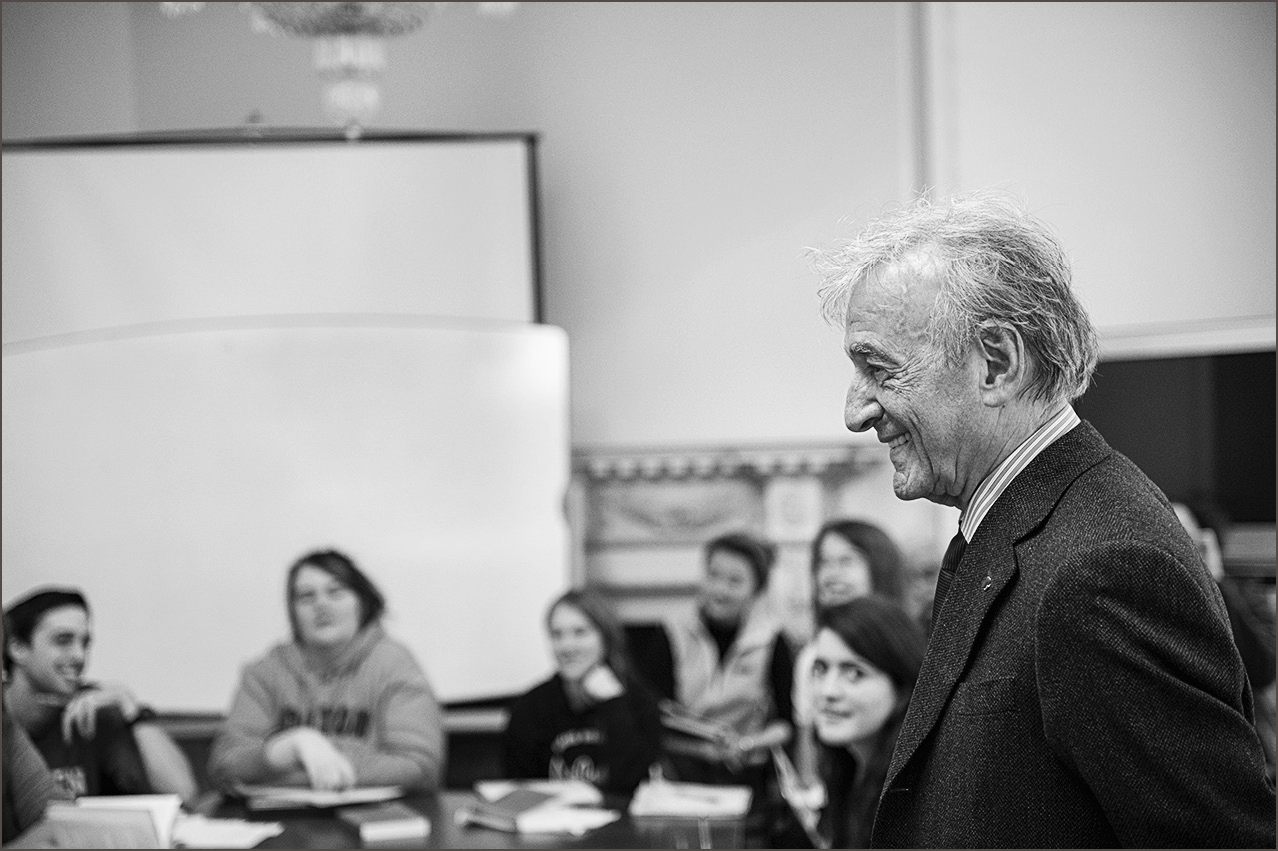Copyright 2018 by Ariel Burger
All rights reserved
For information about permission to reproduce selections from this book, write to or to Permissions, Houghton Mifflin Harcourt Publishing Company, 3 Park Avenue, 19th Floor, New York, New York 10016.
hmhbooks.com
Library of Congress Cataloging-in-Publication Data
Names: Burger, Ariel, author.
Title: Witness : lessons from Elie Wiesels classroom / Ariel Burger.
Description: Boston ; New York : Houghton Mifflin Harcourt, 2018. |
Identifiers: LCCN 2018006868 (print) | LCCN 2018008780 (ebook) | ISBN 9781328804075 (ebook) | ISBN 9781328802699 (hardback)
Subjects: LCSH : Wiesel, Elie, 19282016. | Authors, French20th centuryBiography. | Holocaust survivorsBiography. | Holocaust, Jewish (19391945)Study and teaching. | Holocaust, Jewish (19391945)Influence. | Holocaust, Jewish (19391945)Moral and ethical aspects. | BISAC: RELIGION / Judaism / General. | EDUCATION / Philosophy & Social Aspects. | PHILOSOPHY / Movements / Humanism.
Classification: LCC PQ 2683. I 32 (ebook) | LCC PQ 2683. I 32 Z 598 2018 (print) | DDC 848/.91409dc23
LC record available at https://lccn.loc.gov/2018006868
Jacket design by Mark R. Robinson
Cover photograph Wandycz Kasia / Getty Images
Author photograph Maor Ziv-Kreger
v4.0519
by Kalman Zabarsky for Boston University Photography
Text permissions appear on .
This is a work of creative nonfiction. The events are portrayed to the best of my memory. While all the stories in this book are true, some names and identifying details have been changed to protect the privacy of the people involved.
For Ness, Yaakov, Yovel, Menachem;
and for Elijah and Shira
A Note to the Reader
This book is based on twenty-five years worth of journal entries, five years of classroom notes, and interviews with Elie Wiesels students from all over the world. The classroom notes were taken in shorthand in my terrible handwriting, which I sometimes had trouble deciphering.
In addition to my written notes, after I bought my first smartphone (in 2007), every time I met with Professor Wiesel, I left his office and recorded notes on a voice memo. These recordings gave me a window into the content of many of our conversations and reminded me of how I felt upon leaving him. Listening now, I can hear my excitement as I walked up Bay State Road in Boston or Madison Avenue in New York City. I spoke quickly, trying hard not to forget anything.
Recently I found some cards with Professor Wiesels scrawled notes in blue ink in my copies of Goethes Faust, Ismail Kadares Elegy for Kosovo, and Bertolt Brechts Mother Courage and Her Children, all books we were reading in class. His handwriting is difficult to read but I include some of those notes in the book.
And I had the privilege and pleasure of connecting with several of his former close students, who were generous with their time and stories. They shared many of the moments from the classroom that you will encounter in this book as well as their current reflections, shaped by the intervening years, on what it was like to be Professor Wiesels student. I am grateful to them for sharing their memories.
Introduction
Elie Wiesel is best known for his Holocaust testimony and for the universal lessons he drew from his particular experience of tragedy. Author of Night, which has become part of the modern canon and is taught in high schools across the globe, and winner of the Nobel Peace Prize, Wiesel worked tirelessly on behalf of suffering people everywhere. Over decades, he traveled to Cambodia, Bosnia, Moscow, South Africa, and many other places to protest oppression and to bear witness for victims in an effort to let them know they were not alone. He was a writer, witness, and human rights activist, a towering moral figure, in the words of Krista Tippett.
But if you asked him, as several interviewers did over the years, what he saw as the core of his lifes mission, his answer was always the same: teaching. He often said, I am a teacher first, and teaching is the last thing I will give up. He saw his writing as an extension of this role, and his activism as its public face. In one of his memoirs he wrote, In Boston my students gave me joy and vice versa... I learn along with my students... I could stop, I dont... Teaching requires all ones energy, all ones attention, all the curiosity I have. I have no other mtier. And I am not looking for one.
I was Elie Wiesels student, and although he died in July of 2016, I still am. For five years I served as his teaching assistant while pursuing a doctorate at Boston University. I worked with him closely, choosing course topics, planning syllabi and readings, leading discussion sections. In those classes I witnessed his exceptional approach to education. It was academically rigorous, yet welcomed students searches for personal meaning. It was rooted in classical intellectual and literary traditions, yet spoke directly to the most contemporary concerns. It took place in a secular university but comfortably employed religious and theological language. It was, in short, a rare thing: a humanities education designed to produce morally responsible, sensitive, justice-seeking humanists. Over the years, I saw hundreds of students transformed.
But I was his student well before I served alongside him in the classroom; I was his student since the moment I met him, at age fifteen. He was my mentor, my guide, and eventually my friend. He helped me steer my way through complex questions of identity, religion, and vocation to a life of meaning I did not know was possible.
Over twenty-five years, we spent many hours together talking about personal and political matters, our childhoods, biblical stories and commentaries, art, music, faith. I asked him for advice about career decisions, parenting, and marriage. He often responded with other questions for me to ponder rather than answers or specific directives. Yet somehow his questions helped me clarify my own. Because of him, I became something greater than any role Id imagined for myself. I became a teacher.
Elie Wiesel believed in the power of education to change history. He saw the simple act of transmission from teacher to student as a source of hope as the world continued to struggle with itself. We wish for peace, justice, and we know that we need to heal ourselves and our planet, but things seem to be getting worse. We feel overwhelmed and dont know how we can intervene even if we had the strength. We struggle to nurture our inner lives in a noisy time, and faith, any sort of faith, often seems far away. We need compelling moral voices, models of integrity, and they are hard to find.
Elie Wiesel is one such voice, a man whose life experience led him on a quest for knowledge, understanding, and sensitivity. Wiesel was a student when, in May 1944, he was deported with his family to Auschwitz. His mother and younger sister were murdered upon arrival. Elie and his father endured forced labor and then a forced march to Buchenwald, where his father died. American soldiers liberated the camp on April 29, 1945. Elie was sixteen.
After the war, he continued his studies and became a journalist. In 1956 he published his first book, Night, about his experiences during the Holocaust. He began giving talks on classical and modern philosophical, religious, and literary themes, and in 1972 he was invited to teach at City College of New York. In 1976 he moved to Boston University, which he came to see as his intellectual home, and where he taught for the next thirty-four years.

